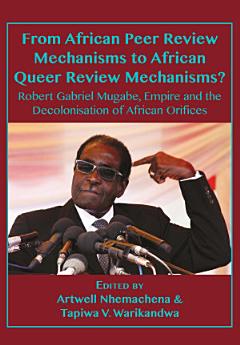From African Peer Review Mechanisms to A: Robert Gabriel Mugabe, Empire and the Decolonisation of African Orifices
Artwell Nhemachena · Victor Warikandwa
Apr 2019 · African Books Collective
Ebook
480
Pages
family_home
Eligible
info
reportRatings and reviews aren’t verified Learn More
About this ebook
Tracing recent bouts of globalised Mugabephobia to Robert Mugabes refusal to be neoimperially penetrated, this book juxtaposes economic liberalisation with the mounting liberalisation of African orifices. Reading land repossession and economic structural adjustment programmes together with what they call neoimperial structural adjustment of African orifices, the authors argue that there has been liberalisation of African orifices in a context where Africans are ironically prevented from repossessing their material resources. Juxtaposing recent bouts of Mugabephobia with discourses on homophobia, the book asks why empire prefers liberalising African orifices rather than attending to African demands for restitution, restoration and reparations. Noting that empire opposes African sovereignty, autonomy, and centralisation of power while paradoxically promoting transnational corporations centralisation of power over African economies, the book challenges contemporary discourses about shared sovereignty, distributed governance, heterarchy, heteronomy and onticology. Arguing that colonialists similarly denied Africans of their human essence, the tome problematises queer sexualities, homosexuality, ecosexuality, cybersexuality and humanoid robotic sexuality all of which complicate supposedly fundamental distinctions between human beings and animals and machines. Provocatively questioning queer sexuality and liberalised orifices that serve to divert African attention from the more serious unfinished business of repossessing material resources, the book insightfully compares Robert Gabriel Mugabe, Thomas Sankara and Julius Kambarage Nyerere who emphasised the imperatives of African autonomy, ownership, control and sovereignty over natural resources. Observing Africans interest in repossessing ownership and control over their resources, the book wonders why so much, queer, international attention is focused on foisting queer sexuality while downplaying more burning issues of resource repossession, human dignity, equality and equity craved by Africans for whom life is not confined to sexuality. With insights for scholars in sociology, development studies, law, politics, African studies, anthropology, transformation, decolonisation and decoloniality, the book argues that liberal democracy is a faade in a world that is actually ruled through criminocracy.
About the author
Artwell Nhemachena holds a PhD in Social Anthropology from the University of Cape Town. He has lectured at a number of universities in Zimbabwe. Currently he lectures in Sociology at the University of Namibia. He has published journal papers, book chapters and books on violence and conflict, relational ontologies and resilience, environment, development, democracy, research methods, humanitarianism and civil society organisations, anthropological jurisprudence, mining, society and politics, religion, industrial sociology, decoloniality and social theory. He is a laureate and active member of CODESRIA since 2010.
Tapiwa Victor Warikandwa holds a PhD in Laws from the University of Fort Hare in South Africa. He is a Senior Lecturer in the Faculty of Law at the University of Namibia. He has researched and published on various aspects of Law in Namibia and Zimbabwe.
Rate this ebook
Tell us what you think.
Reading information
Smartphones and tablets
Install the Google Play Books app for Android and iPad/iPhone. It syncs automatically with your account and allows you to read online or offline wherever you are.
Laptops and computers
You can listen to audiobooks purchased on Google Play using your computer's web browser.
eReaders and other devices
To read on e-ink devices like Kobo eReaders, you'll need to download a file and transfer it to your device. Follow the detailed Help Center instructions to transfer the files to supported eReaders.




